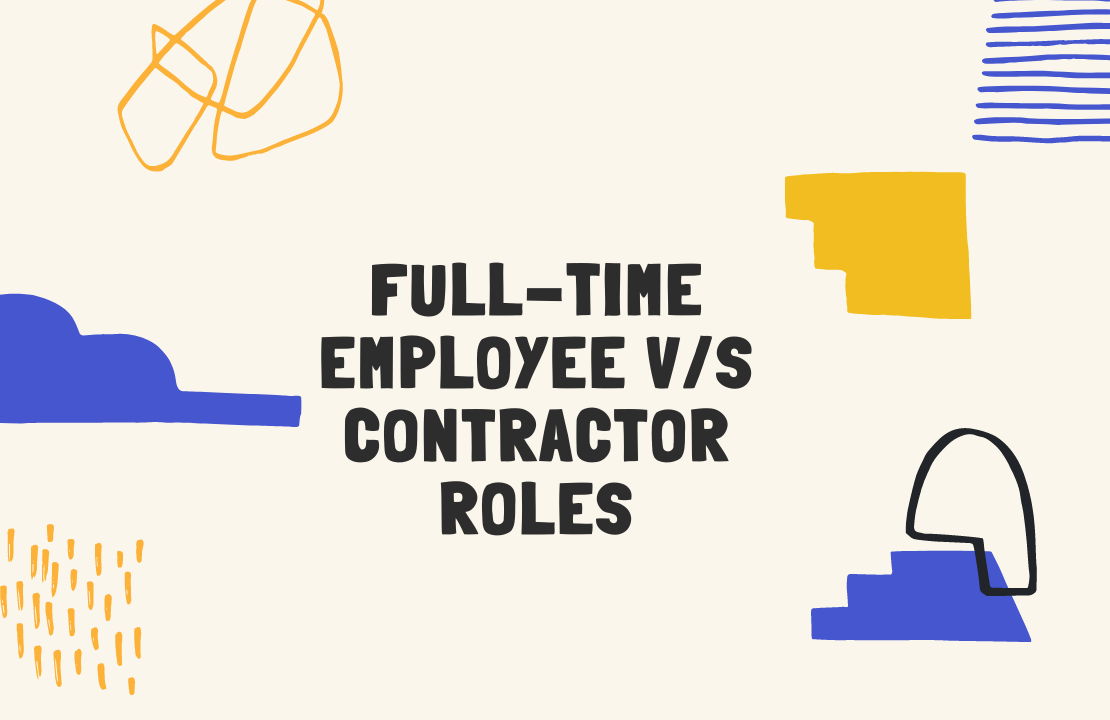Table of Contents
Janet has recently started working as a Recruitment Coordinator in a maternity cover role for a fixed period of 6 months. Her teammate Mark has been working in the role for the past 2 years. While both of them perform the same responsibilities, their employment type is governed by different laws, and their pay is different too.
The reason behind this is that Janet has been appointed in a contractor role while Mark is a full-time employee of the firm. To help you understand this better, we will talk about the key differences between an employee and a contractor role in this article. This will also help you contemplate which role would suit you better. Let’s have a look below.
How does permanent employment differ from contractual employment?
According to the UK government, employees in a contractual role have a fixed contract that ends on a particular date or completion of the project. They can be termed as ‘seasonal’ or casual’ employees hired for a specified period. These can be specialists or substitute employees to cover roles in the absence of a full-time employee. On the other hand, a permanent employee can be full-time or part-time but works on an open-ended contract. This is also referred to as a permanent contract that does not expire. The key differences are:
1. Term
Professionals in contractor roles are a part of temporary employment. Their fixed tenure is reflected in their contracts. They are meant to work for a short period in the company unless the opportunity to extend or convert the role to permanent arises. This is when their contract is amended based on the new terms and conditions. A permanent employee, on the other hand, signs a contract for an indefinite period.
2. Compensation
The salary of contractors is usually per hour or project-based. On the contrary, a full-time employee’s salary is fixed on a yearly basis and is paid monthly or fortnightly, as decided in the contract. A contractor’s compensation usually does not have any benefits such as bonus, pension or leave encashment options. A permanent employee’s compensation package typically includes all of these, along with other benefits such as commissions, incentives, and remuneration in kind. However, the rate per hour of contractors is significantly higher than a full-time, permanent employee. You can find the minimum wage rates for the UK here, the USA here, and Canada here.
3. Training
Training and development are crucial for permanent employees as it allows them to enhance their skills and knowledge, and start things on the right note. Thus, employers spend a couple of days training and developing their employees on a regular basis. On the flip side, contractors are expected to have the required skills, knowledge, and expertise. So while employers may spend some time orienting them to the new processes, they are usually not involved in any training and development initiatives.
4. Autonomy
The degree of flexibility and autonomy in a contractual relationship is higher in comparison to permanent employment. A permanent employee is expected to go by the books and follow the common practices adopted by the employer. For a contractor, things are slightly more flexible. They have the autonomy to work at their own pace, in their own style, as long as the project’s goals are being met. They have greater control over their hours and responsibilities. In most cases, for contract workers, the focus is on ‘results only’, whereas for permanent employees, the focus is on how, when, where, and results.
5. Career Progression
In a permanent role, you will receive promotions based on your performance, whereas, as a contract worker, you are not deemed to receive any promotions. To progress in your career as a contractor, you would need to look for another job at a higher level in the hierarchy after the completion of your current contract. A different path to achieve career progression could be to switch to a permanent role. This will help you move up the hierarchy in the same organization smoothly.
Are you a good fit for permanent employment or contractor roles?
Are you wondering if you will be a good fit for permanent employment or contractual roles? Well, there are a few factors that you may consider before deciding on your employment type. Let us help you decide with the key ones:
1. Are you looking for a long-term role?
If you are one of those professionals looking for a long-term role, a permanent opportunity will suit you more than a contractor role. Working in contractor roles comes with challenges. Once a role gets over, you will be on the lookout for a new one, and this will continue until you decide to shift to permanent roles. However, if you are someone who has other priorities such as personal commitments or is self-employed looking for short-term roles at uneven intervals, then contractual roles would benefit you more.
2. Are you willing to take financial risks?
Permanent roles guarantee you a fixed regular income, but for a contractor, there is no permanent income as the role is temporary. Thus, financial risk in a contractual role is higher as compared to a permanent role. However, this risk is accompanied by the opportunity to earn higher as the rate per hour is higher for a contractual role than for a permanent role. So, if you can afford to take a higher financial risk with a higher return, a contractual role would benefit you more.
3. Can you afford to work in an unstable position?
COVID-19 has demonstrated what a vulnerable job market looks like. When layoffs occur in an organization, temporary workers or freelancers are usually targeted first, and permanent employees are the last ones to be laid off. As a job seeker considering a contractual role, it is important to know that this comes with instability. If you are someone who cannot afford this, we advise you to go for permanent roles rather than looking for contractual ones.
Contractual jobs and permanent jobs – which is a better option?
It completely depends on your needs and requirements. Both have their pros and cons, and it is up to you to choose what aligns best with your interests. The job search process for both types of employment is the same. What ensures success is how you approach these roles. We recommend presenting your story effectively with a best-practice resume and a well-written cover letter. Make sure you customize your documents for each application and leverage your strong network.











